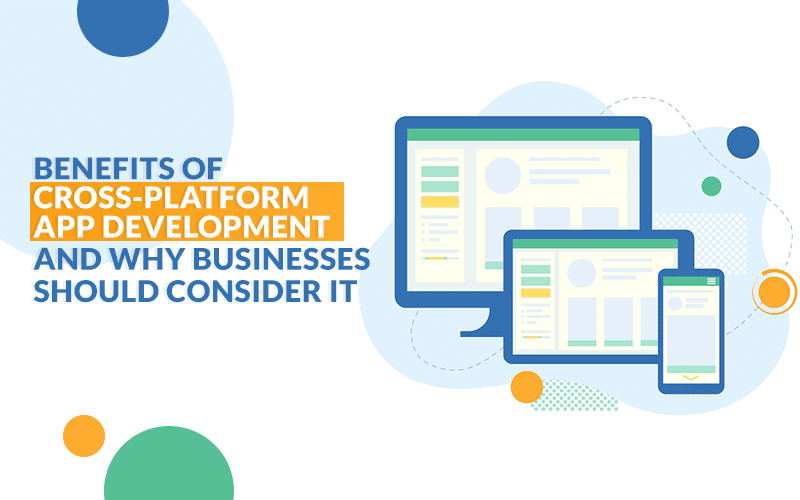Benefits Of Cross-Platform App Development And Why Businesses Should Consider It
Mobile apps have grown business from the ground up, and the trend is getting more and more elaborate day by day. If you are planning a business, and an app can be its USP, you should highly consider focusing your service or product based on selling through a mobile app. There are a variety of types of mobile apps, a bit shy of about 5million combined on both popular mobile app platforms, and their difference isn’t much.
According to Buildfire, about 2 million on the Appstore, and about 2.9 million on the Playstore, which clearly means you need to target both platforms for maximum impact. While the old way was to create Native apps for both platforms, then came Hybrid, and now the Cross-platform is the most popular choice. In a cross-platform app, the components are Native, unlike web views in a Hybrid app, making it very much alike Native apps.

What Are the Various Types of Mobile Apps?
1. Native Apps
The old school apps are usually made using Kotlin in case of Android, and Swift in case of Apple. The most capable and the most expensive out of all the app development paths listed here. The apps are built ground up, and each cost in full to create, there is no code reusability, and the testing and maintenance are both separate for each of the apps.
2. Cross-platform Apps
The development path we are here to discuss upon today, cross-platform has been a very lucrative platform for businesses to get their mobile apps developed. The frameworks for building cross-platform apps allows over 90% code reusability between the iOS and Android apps, ensuring you can target both platforms, with Native equivalent performance and optimisation, in lesser price and time.
3. Hybrid Apps
Hybrid apps can be viewed as apps which directly hit web views to function, the Native browser engine of the device supports these types of apps. PWAs and Hybrid apps are very similar, but the latter lets you use many device sensors, and the apps are allowed to publish on both the AppStore and Playstore. The code reusability ratio is very, and a mobile website to Hybrid app migration is inexpensive and much easier.
4. PWAs
Progressive web apps are a faster and optimised version of normal web applications, can be downloaded to be directly accessed without entering the URL in the browser. The apps work almost the same way with mobile optimised views and functions for the mobiles, and cannot be published on the respective application stores. There are both cons and pros to it, but when directly compared to Native or Cross-platform apps, they lack the optimisation and performance, apart from various basic necessities expected out of a mobile application.
Now that we know about the development paths on offer, you might want to know what makes Cross-platform so special that we are writing benefits of choosing it as a business. The answer isn’t as simple, there are various advantages it has on offer, and you need to make choices about the things you want from your application, to make a wise decision.
Let’s begin with the top benefits of cross-platform app development, and the reasons to choose it as a business.

1. Multiple Apps
Cross-platform is famous for this very benefit it has on offer. You can create multiple apps optimised for various platforms with much less effort than building Native apps. The cross-platform development path will allow you to reuse code at a very high degree, with technologies like Flutter allowing custom design components for iOS and Android over code reusability.
With over 90% code being resued, and all in the same language for coding, you need not worry about hiring developers separately for iOS and Android app development. When you hire cross-platform app developers, they can by themselves create both the apps, cutting down the cost to hire by a huge margin. There are many more benefits of reusing the code, and it also means less issue to deal with in the future.
2. Uniformity
Getting two apps developed by two individual teams can lead to both being very different in a lot of ways. While the developers will implement your app through custom app development, you would still face trouble getting both native apps on the same page. The cross-platform app development path changes things, with most essentials being used to create both the apps.
While the functionality of the apps will be almost the same, the same code would mean an exact replica of the app, with major changes in the design only. The user interface and user experience would remain highly similar, with design changes in the user interface. Building a brand requires an image and uniformity, which can now be easily achieved in both the mobile apps you build through cross-platform app development technologies.
3. Testing
Since we are building apps using almost the same code, the testing is going to be less rigorous and easier. It is also thanks to the hot reload feature we see in popular cross-platform app development frameworks that make on the go testing easier and convenient. The testing still needs to be done for all compatible devices, but that would be the case even if you build to separate apps.
With testing and bugs comes fixing them, and since the code remains very similar, the fixes would be too. It is simply hitting two birds with one stone, you test one, you fix two, as simple as that is when you use cross-platform app development frameworks to build your mobile apps. While cross-platform development technologies might still be new, they are nowhere near stopping to improve with each passing day, we can easily assume better versions which makes testing even easier.
4. Maintenance and Updates
The journey begins when your business takes off through your app’s popularity. Building an app is another journey, but sustaining it through maintenance and updates is what truly demands cross-platform app development methodology. Since the two apps are built through one code, the time saved in building the app would be much like the case when maintaining and versioning it.
Both are time intensive and very costly tasks to achieve, with you saving much of the cost by building two apps using code reuse, you can invest more in research. Try planning out the maintenance and updates along the way or even at the start, to give your app the thrust as it begins to shine. One of the main points of the popularity of cross-platform app development is the ease of maintenance, it saves cost and time in the long term.
5. Saves cost and Time
Every business out there is to earn money, and saving it while ensuring to make more money is something everyone wants. It must be pretty clear by now how cross-platform app development methodology can help you save massive amounts of money compared to generic native app development. The reasons as mentioned earlier are simple, you need to hire fewer people, and for a lesser amount of time.
As we discussed in the previous point, not only this development path saves you time and cost while building the apps, but even after that. You can save massive long term maintenance costs when you choose smart in the beginning. Another very important aspect in mobile app development is the time to market entry, and with lesser time being taken to build the app, you can rest assured of an early market entry if you go with cross-platform app development.
Conclusion
The development path is a very necessary choice when it comes to building a mobile app for your business. While they are further dependent on the technology you choose within them, the overall would make a major difference in your business. As we said above, the native path for the most capable apps, the cross-platform for slightly less capable but about half the cost. The Hybrid in lesser cost than a cross-platform but for a bad trade-off performance, and PWAs in case you want an app to be downloaded from the browser itself.
If all of this still confuses you, do not worry as it is very complicated to choose a development path on the ground level itself. We have years of experience in Andriod app development and iOS app development and have been working in cross-platform app development since its very inception. Since no technology is lesser than the other, we have some of the best Hybrid app developers along with master native and cross-platform app developers, to serve each of the clients with an app which perfectly fits their requirements. If you are interested in getting a mobile app developed for your business, contact us and we will help you with it.




